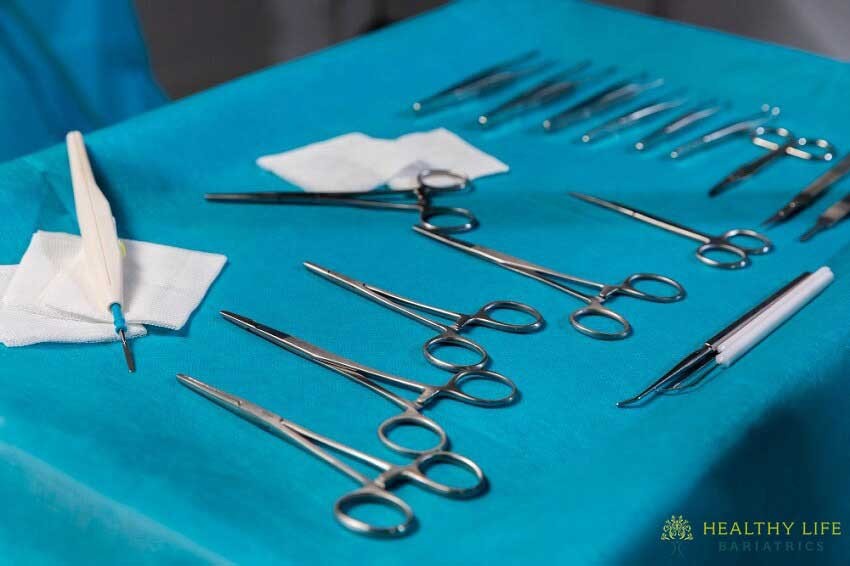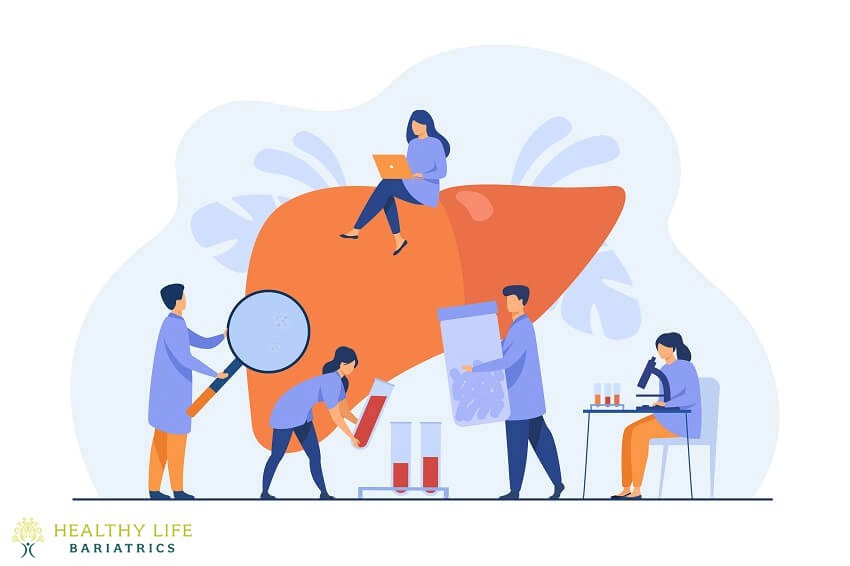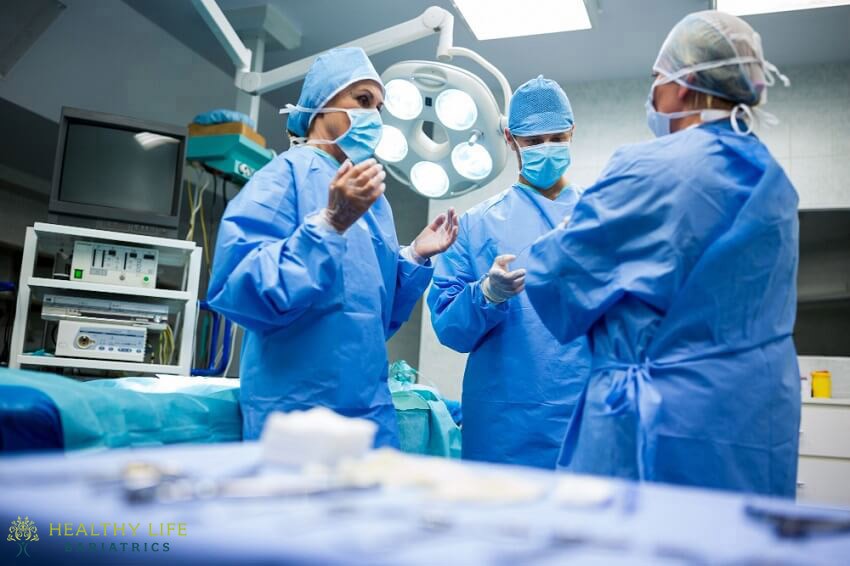
you suffer from a debilitating hernia, a painful gallbladder issue, or GERD (gastroesophageal reflux disease), you will need to visit a general surgeon for an official diagnosis. A procedure may then follow to help you find relief.
Sadly, few people know about hernia treatment, or about those intended to provide comfort for gallbladder problems. Even fewer know about surgeries to treat GERD. And no, taking TUMS doesn’t always help.
The following should provide clarity around this subject, and this information is important to know for everyone. Each one of these problems can be painful or life-threatening, depending on the severity. To help you find relief, keep reading about the amazing surgeries used to treat these common ailments.
You are said to have a hernia when an organ pushes through the structure or muscle that is meant to contain it. Most people with hernia problems find that the protrusion occurs in the abdominal wall, whereby the intestine finds and pushes through a weak spot in your abdominal muscles. The most common abdominal wall hernia is the inguinal hernia.
There are around 800,000 inguinal hernia repair surgeries performed in the United States each year, according to the FDA. Men more than women tend to form the condition and seek out surgery, and the problem tends to be exacerbated by age. Most inguinal surgery cases involve men aged 75 to 80, though women are not exempt from the severity of the condition.
There are several distinct versions of the condition we know as the hernia. Here are some of the most common ones we see at the Healthy Life Bariatrics surgical center in Los Angeles, California.

An inguinal hernia forms in the inner groin area. The intestine protrudes through one of two passages in the lower abdominal wall, otherwise referred to as inguinal canals. Up to 40% of all men and 3% of women will develop this type of hernia in their lifetimes.
A hiatal hernia forms when stomach tissue bulges through a small opening in the diaphragm. This opening is known as a hiatus, which allows the esophagus to pass through the diaphragm. The esophagus, as you may know, carries food from the mouth to the stomach, just to refresh your knowledge of anatomy.
Read our article: Hiatal Hernia Repair and Sleeve Gastrectomy – Fix Hernia Related Issues like GERD & Lose Weight Safely by Combining These Two Surgeries
A femoral hernia occurs in the upper thigh or outer groin area. The problem occurs when organ tissue passes through the deep canals within these areas. Femoral hernias are not as common as inguinal hernias and are more common in women. Femoral hernias can quickly become problematic if you don’t catch and treat them early.
These hernias occur because an opening forms in the abdominal wall. The ventral hernia has three subcategories you should be aware of.
If you have ever undergone abdominal surgery, you may be susceptible to an incisional hernia. This is when the incision made during the procedure caused the abdominal wall to weaken, leading to protrusion.
Umbilical hernias form near the belly button and are most common in newborn babies. Premature babies are particularly susceptible to umbilical hernias. In most cases, the hernia closes on its own as the child ages. When they occur in adults, they can lead to significant health problems.
Epigastric hernias are caused by the intestine pushing through a weakened abdominal wall above the belly button.

Most hernias cause a bulge or lump to form under the skin. Some people may even experience pain as the hernia becomes worse. Not everyone sees a noticeable change.
Hernias can cause discomfort or pain that can become worse when straining or lifting heavy objects. Sometimes standing is enough to cause a hernia to hurt.
Those are the symptoms for most hernias, but not a hiatal hernia. Hiatal hernias do not cause bulges. Instead, their primary symptoms include acid reflux, heartburn, and the regurgitation of food or liquids. Medication can help to alleviate hiatal hernia symptoms.
When pain and discomfort become severe, surgery may be necessary.
Just as there are distinct types of hernias, there are two separate types of hernia surgeries.
Open surgery literally means the general surgeon opens your abdominal cavity by way of an incision to repair the weakened abdominal wall. Once the wall is strengthened, the organ tissue will remain in place. Mesh material is sometimes used to further strengthen the abdominal wall, reducing the need for hernia surgery in the future.
The term laparoscopic refers to a set of serpentine tools that the surgeon uses to work inside the abdominal cavity without having to open you up. Small incisions are used, which function as entry points for the necessary tools. The surgeon makes the small cuts along the lower abdomen and inserts a camera with a light attached, which allows for easy viewing on a nearby monitor. The tools involve the robotic repair of the abdominal wall, which is safer than open surgery, leads to fewer scars and involves less downtime.
Read our article: Which Type of Hernia Surgery is Right for You?
The aforementioned surgeries are useful for repairing hernias that cause little to no discomfort or pain.
You should seek immediate attention if the hernia bulge grows or no longer hides when you lie down, and when severe pain is accompanied by redness around the area, fever, and vomiting. These are signs that the hernia has become strangulated, which means the organ tissue is now trapped, leading to a loss of proper blood flow.
Read our article: Abdominal Hernia Repair Surgery and the Recovery Time You Should Expect
Gallbladder surgery is common. So common, in fact, that it is designated as one of the most common surgeries in the United States. Hundreds of thousands of men and women have gallbladder surgery each year, which involves the complete removal of this organ.
The gallbladder is an organ that looks like a pear sitting just below the liver. The gallbladder’s job is to store bile, which is a fluid that the liver produces to assist the body in the digestion of fat. Bile is released from the liver into the gallbladder by a bile duct, a tube-like structure that connects the gallbladder and liver to the small intestine.
For most, the gallbladder works fine. Problems arise when the flow of bile becomes blocked, leading to inflammation and potential infection.
How does the bile duct become blocked? Gallstones are usually to blame.
Gallstones are small substances that form in the gallbladder that look like tiny pebbles. They develop when bile collects an overabundance of salt or cholesterol, which forms the solid stones. When gallstones block the bile ducts, abdominal pain can result. Doctors refer to this as a gallbladder attack.
Some people form gallstones with no symptoms, nor do they require treatment. But if you experience a gallbladder attack that causes severe pain, your gallbladder might require gallbladder surgery.
Read our article: Gallstone Pain? Gallbladder Surgery Could Help

Gallbladder surgery is used to treat signs of serious infection from a gallbladder attack. Severe symptoms include pain, fever, chills, vomiting, jaundice, and urine that looks like tea, as well as stool that turns a light color.
Gallbladder surgery removes the gallbladder entirely. While it sounds drastic, realize that the gallbladder is not an essential organ. Plenty of people go on to live normal lives without one.
When the organ is removed, bile will pass to the small intestine through other paths, so there is no need to worry about surgery hindering normal digestive function.
Like hernia surgery, there is both open-type surgery and laparoscopic surgery.
Open surgery is used when the gallbladder is severely infected. The surgeon removes the gallbladder entirely before closing the surgical site, making it a simple and safe surgery by all accounts.
Laparoscopic gallbladder surgery (also referred to as laparoscopic cholecystectomy) is minimally-invasive, much like the hernia surgery of the same type. The incisions are small, and the risk of infection is highly reduced when compared to open surgery. You are also less likely to experience blood loss.
During a laparoscopic cholecystectomy, the general surgeon makes four small incisions along the abdomen. The incisions function as entry points for the serpentine camera. Other tools are inserted through the other cuts so that the robotic surgery can be performed.
GERD stands for gastroesophageal reflux disease. The condition is diagnosed when you experience chronic or severe acid reflux.
Some people have mild to moderate symptoms of GERD, which they can easily control with dietary and lifestyle changes. Medications used to treat GERD include H2 blockers, proton pump inhibitors (PPIs), and over-the-counter antacids.
For others, GERD doesn’t go away no matter how you live your life or what you eat. For those individuals, surgery may be the only option to find relief.
GERD surgery aims to repair or replace the valve at the bottom of the esophagus that keeps stomach acid from backing up into the throat. Doctors call this valve the lower esophageal sphincter or LES. When the LES becomes weak or damaged, GERD can develop.
When left untreated, GERD can form into a condition called Barrett’s syndrome, which increases the risk of esophageal cancer.
GERD surgery is recommended to treat severe complications from GERD, which can include inflammation of the esophagus, bleeding, and ulcers. Over time, scars from tissue damage can form, which can make it difficult to swallow normally.
General surgeons usually only operate on GERD sufferers as a last resort. Your doctor will first attempt management through dietary and lifestyle changes. If this road to recovery is fruitless, surgery can be useful to help relieve severe GERD symptoms.
There are a few distinct types of GERD surgeries. Let’s look at two of the most common now.

During this procedure, which is the standard treatment for GERD, the LES is tightened and reinforced. The surgery is performed as an open operation. The surgeon first makes an incision in your stomach to gain access to the lower portion of the esophagus. The upper portion of the stomach is then wrapped around the outside of the lower esophagus to strengthen the LES.
This method of surgery works the same way as the open version, only the incisions are smaller.
To prepare for both types of surgeries, the general surgeon will recommend that you maintain a clear liquid diet for a day or two before your scheduled operation. The surgeon will ask you to refrain from eating on the day of surgery and will provide medication to you to cleanse your bowels to make surgery easier and safer.
You now know much more about hernias, gallbladder issues, and GERD, as well as the complications that can require surgery for these common conditions.
If you suspect you have a hernia, gallbladder attack, or a severe form of GERD, we recommend that you receive an official diagnosis to avoid further complications. While GERD is typically not life-threatening, a strangulated hernia and serious gallbladder attack can be. Therefore, never wait to get help, especially if you’re in pain. You never know when a simple procedure can have you healed up and back to living life normally once more.
You can schedule a consultation for general surgical procedures like the ones above by contacting or visiting Healthy Life Bariatrics in Los Angeles, California. Dr. Babak Moeinolmolki specializes in minimally-invasive laparoscopic surgeries that offer minimal scarring and less downtime when compared to open surgeries. Call today to choose a time that works best for you.